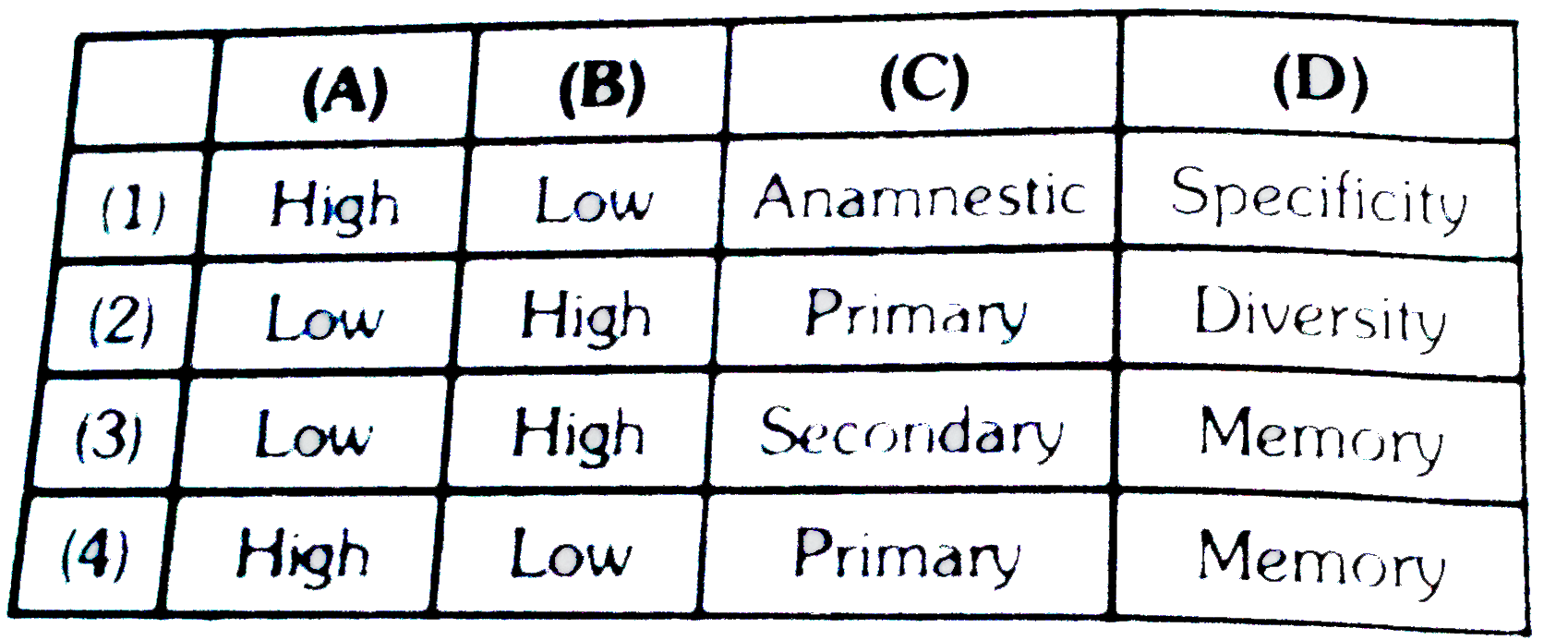Assertion : Subsequent encounter with the same pathogen elicits a highly intensified anamnestic response.
Reason : This is based on the fact that our body appears to have memory of the first encounter.
If both assertion and reason are true and reason is the correct explanation of assertion.
If both assertion and reason are true but reason is not the correct explanation of assertion.
If assertin is true but reason is false.
If both assertion and reason are false.
The correct Answer is:A
Topper's Solved these Questions
- HUMAN HEALTH AND DISEASEBOOK - NCERT FINGERTPS ENGLISHCHAPTER - HUMAN HEALTH AND DISEASEEXERCISE - Human Health And Disease
177 Videos
- EVOLUTIONBOOK - NCERT FINGERTPS ENGLISHCHAPTER - EVOLUTIONEXERCISE - All Questions
160 Videos
- HUMAN REPRODUCTIONBOOK - NCERT FINGERTPS ENGLISHCHAPTER - HUMAN REPRODUCTIONEXERCISE - Human Reproduction
185 Videos
Similar Questions
Knowledge Check
Consider the following four statements (a-d) and select the option which includes all the correct ones only:
a) B-lymphocytes forms cellular barrier of innate immunity.
b) HLA antigens are called as transplantation antigens
c) Subsequent encounter with the same pathogen elicits a highly intensified anamnestic response.
d) Interferons protect non-infected cells from further viral infection.AStatements, b, c, dBStatements b, cCStatements c, dDStatements a, c, dAssertion. Second infection of the same pathogen is quickly eliminated.
Reason. Preformed memory B and T-cells elicit a quick and vigorous attack on pathogens.AIf both A and R are true and R is the correct explanation of A.BIf both A and R are true but R is not the correct explanation of A.CIf A is true but R is false.DIf both A and R are false.Assertion : Our body contains separate T-cells every antigen the body encounters.
Reason : Each T-cell recognizes a specific antigen.AIf both Assertion and Reason are true and Reason is correct explanation of Assertion.BIf both Assertion and Reason are true but Reason is not correct explanation of Assertion.CIf Assertion is true but Reason is false.DIf both Assertion and Reason are false.
When our body encounters first time with a pathogen. Then the first time low intensity response is known as :-
View SolutionAssertion. Second infection of the same pathogen is quickly eliminated.
Reason. Preformed memory B and T-cells elicit a quick and vigorous attack on pathogens.
View SolutionPrimary response which is of _____(A) _______ intensity. Subsequent encounter with the same pathogen elicit a ______(B) ______intensified______(C)______response, which is based on _____(D)______

View SolutionPrimary response which is of _____(A) _______ intensity. Subsequent encounter with the same pathogen elicit a ______(B) ______intensified______(C)______response, which is based on _____(D)______

View SolutionDirection: In the following paragraph read the passage completely to answer the questions from the given options.
The catalytic fact of the twentieth century is uncontrol label development, consumerist society, political materialism, and spiritual devaluation. This inordinate development has led to the transcendental second reality of sacred perception that biologically transcendence is a part of human life. As the century closes, it dawns with imperative vigour that the first reality of enlightened rationalism and the second reality of the Beyond have to be harmonized in a worthy state of man. The de facto values describe what we are, they portray the is' of our ethic, they are est values (Latin est means is). The ideal values tell us what we ought to be, they are esto values (Latin esto ought to be'). Both have to be in the ebb and flow of consciousness. The ever new science and technology and the ever-perennial faith are two modes of one certainty, that is the wholeness of man, his courage to be, his share in being.
The materialistic foundations of Science have crumbled down. Science itself has proved that matter is energy, processes are as valid as facts, and affirmed the non-materiality of the universe. The encounter of the two cultures, the scientific and the humane, will restore the normal vision, and will be the bedrock of a science of understanding in the new century. It will give new meaning to the ancient perception that quantity (measure) and quality (value) coexist at the root of nature. Human endeavours cannot afford to be humanistically irresponsible.
Encounter of the 'two cultures', the scientific and the human implies
View Solution
